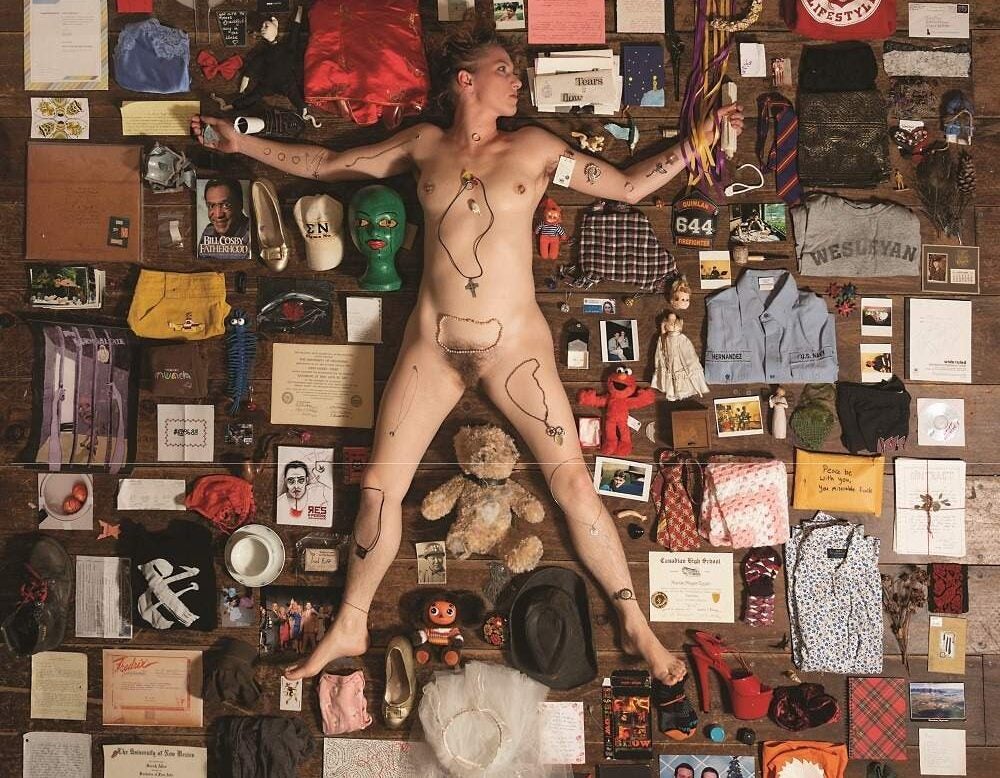
When it comes to monetising her work, performance artist Amanda Palmer is as explicit as her creations. Here she explains all to Emelia Hamilton-Russell
Amanda Palmer is excited about her upcoming UK tour, so much so that she yells down the crackly transatlantic phone so loudly that I have to hold the receiver away from my ear. ‘I married one of you fucking lot,’ she exclaims in reference to her strong links with the UK. ‘Still can’t believe I did that.’
Her husband of eight years, Neil Gaiman, is more than just ‘one of us lot’. The author of novels including The Graveyard Book and American Gods, which has been made into a Netflix series, is a national treasure. Together, the two are a punk-gothicfantasy creative powerhouse with overlapping cult-like followings.
Palmer was one half of the punk duo the Dresden Dolls – and caused a generation of teens in the early Noughties to consider removing their eyebrows and replacing them with elaborate swirls of eyeliner. Her memoir, The Art of Asking, was summed up by Gaiman on a book festival stage as ‘a manifesto about who you are, what you do, and how to make money on the internet, right?’.
Who she is and what she does is easily tackled: ‘I am Amanda Palmer; predominantly a song writer, but also a book writer and a blog writer and – for people that are uninitiated – it’s safe to say that I’m a crowdfunded creative person,’ she says.
The latter – how to make money on the internet – is the holy grail. But Palmer seems to have cracked the code. In 2012, after disbanding the Dresden Dolls and acrimoniously breaking from her record label, she turned to Kickstarter – then a new-fangled online platform aimed at start-ups. Palmer raised an unprecedented $1.2 million to fund her next album, Theatre Is Evil, after which she became a global phenomenon – albeit one you may not have heard of. Either way she’s possibly the first truly crowdfunded celebrity artist and has helped transform the patronage of artists as we know it.
Palmer has been using a combination of Kickstarter and the subscription based platform Patreon to ‘keep the lights on’ ever since. Fans pledge to pay an amount of their choosing per ‘thing’, which could be a video, a long-form essay, a piece of open-air theatre, a poem or an off-the-cuff song.
When you have 15,000 people paying by direct debit, it adds up to a substantial income. She says the financial setup also affords her work a degree of spontaneity, allowing her to respond to the news cycle immediately, rather than waiting for a committee of people to deem her output ‘saleable’. The song and music video she put out in 2017 entitled Mr Weinstein Will See You Now is an obvious example. It’s untethered and vulnerable and seethes with the barely contained grief and fury that rose up with the #TimesUp movement in a way that no commercially packaged, institution-backed production could.
‘I think it’s really fucking powerful,’ Palmer says of her ability to ask people for money for a project and receive it. ‘I think the filtration system, the curation system of art, will improve dramatically once more things are done through crowdfunding. It’s never good to leave it in the hands of a couple of powerful academics or producers. I want to believe that in a world 50 years from now, the technology that’s showing up on our doorstep – highspeed internet, blockchain – will actually, in every way possible… it would be really great if humanity could get its shit together and let technology aid us in taking the power away from the cultural 1 per cent.’
She has drawn criticism in the past for advertising for voluntary musicians. It’s a subject we don’t broach but is perhaps at the back of her mind. ‘I think one of the problems with our whole industry is that everyone – including the artists – want to believe that money and art shouldn’t touch. But we all know that’s bullshit. We all know that Sylvia Plath had to pay her fucking rent. We all know that I have to pay my rent. We all know that no matter who the artist is, if they’re making a living making their art, at some point commerce is going to have to touch the art.’
Her latest album, There Will Be No Intermission, is named for the ‘relentlessly relentless’ seven-year period that led up to it. ‘That’s the bit about being an artist that I both loathe and love,’ she says. ‘Sometimes an idea presents itself and it’s not necessarily that comfortable but you do it anyway. You just have to.’
Amanda Palmer’s UK tour, There Will Be No Intermission, starts on 16 October and will be in London’s Union Chapel from 5-13 December
Photo credit: Kahn & Salesnick
Emelia Hamilton-Russell is junior staff writer at Spear’s








